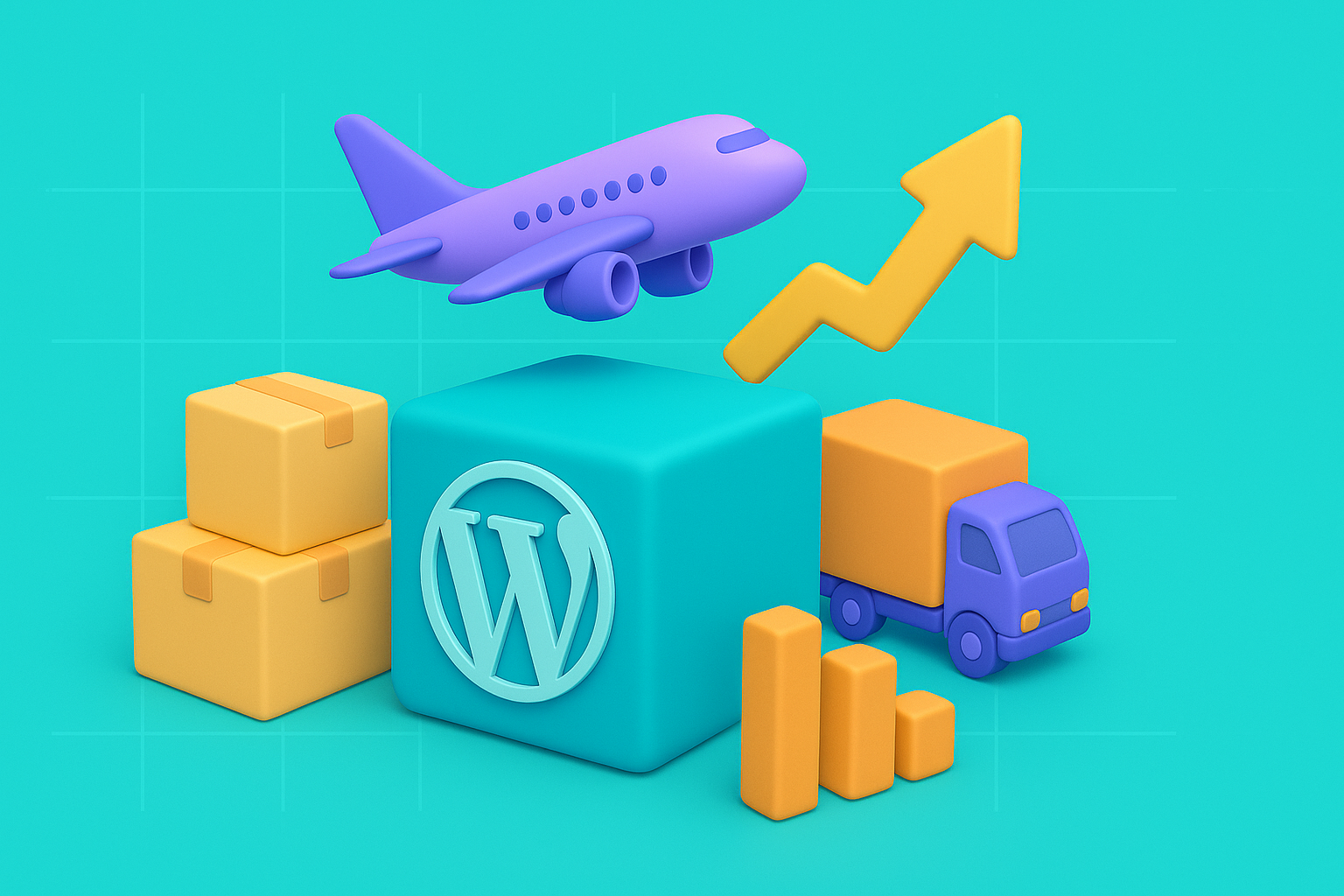Streamlining Logistics Operations: WordPress Development for Transportation and Supply Chain Leaders
April 24, 2025 ● 10 Mins Read

Table of Contents
Introduction
The transportation and supply chain sectors are undergoing rapid transformation. Digital solutions are now the backbone of operational efficiency, enabling businesses to stay competitive, reduce costs, and meet customer demands. For industry leaders, embracing modern technology is not just an option but a necessity to thrive in an increasingly digital marketplace.
WordPress, traditionally viewed as a content management system (CMS) for blogs and websites, has evolved into a powerful platform capable of handling complex business needs. With advanced customization, security features, and integration capabilities, WordPress is becoming a strategic tool for leaders in the logistics and supply chain industries. This blog explores how WordPress development can streamline logistics operations and provide a competitive edge to transportation and supply chain businesses.

The Power of WordPress in Logistics
Logistics and transportation businesses often rely on various digital tools to manage operations whether it’s coordinating deliveries, tracking shipments, managing inventory, or communicating with partners. WordPress offers a flexible, scalable solution to unify these processes into a cohesive, easy-to-manage system. Here’s how advanced WordPress development can streamline operations:
Custom Dashboards for Real-Time Monitoring
In the logistics industry, real-time visibility is crucial. Advanced WordPress development can create custom dashboards that provide leaders with a real-time overview of their operations. These dashboards can display vital data, such as:
- Shipment tracking status
- Inventory levels
- Delivery timelines
- Fleet management insights
With WordPress ability to integrate third-party logistics software (via APIs), you can seamlessly connect your internal systems to offer a centralized, unified platform. This level of monitoring can drastically improve decision-making and response times, helping businesses optimize routes, reduce delays, and ensure efficient resource allocation.
Seamless Integration with Logistics Software
Transportation and supply chain companies often use specialized software such as warehouse management systems (WMS), enterprise resource planning (ERP), and customer relationship management (CRM). WordPress can act as the digital hub, integrating with these systems to streamline workflows. Through API integration, WordPress can pull data from these systems and present it in user-friendly formats, allowing business leaders to make data-driven decisions with ease.
Some key software that can be integrated with WordPress includes:
- Fleet management tools
- Inventory tracking systems
- Shipment and delivery management solutions
By integrating these tools within a WordPress framework, businesses can improve the accuracy and timeliness of their operations, leading to better efficiency across the supply chain.

Optimized E-commerce Capabilities
For logistics companies handling e-commerce, WordPress offers robust solutions. With plugins like WooCommerce, transportation companies can set up fully functional ecommerce stores to offer services like freight booking or shipment tracking directly from their website. This integration reduces the need for external tools, making operations more streamlined.
Beyond just handling orders, WooCommerce can integrate directly with shipping carriers, calculate shipping costs in real-time, and offer clients a transparent view of the entire delivery process. This efficiency not only improves customer experience but also enhances operational flow by automating time-consuming tasks.
Enhanced Communication and Client Portals
Client communication and satisfaction are integral to logistics success. With custom WordPress development, transportation businesses can set up secure client portals, where customers can:
- Track their shipments
- Communicate with customer service
- Access invoices and billing information
- Schedule deliveries or services
These portals can be designed to integrate seamlessly with other logistics systems to provide clients with real-time updates, leading to better transparency and trust. For business leaders, such portals reduce the manual intervention needed for client communication, thus freeing up resources to focus on growth and strategic planning.
Mobile-Responsive Design for Field Operations
A mobile-responsive WordPress website is essential for logistics and supply chain leaders who need to manage operations on the go. Delivery drivers, warehouse personnel, and fleet managers can access critical data directly from their smartphones or tablets. This real-time access to data ensures that everyone in the operation, from field teams to leadership, is aligned and informed.
Mobile optimization is also crucial for clients who may want to check shipment statuses or communicate with your team via their mobile devices. A well-designed, mobile-responsive WordPress site offers a seamless experience, ensuring that customers and team members can access the platform without disruption.
Scalable Solutions for Growth
As businesses grow, so do their operational needs. One of the key advantages of WordPress development is its scalability. Whether a logistics company operates locally or manages international operations, WordPress can scale alongside it. With thousands of plugins, themes, and custom development options, WordPress allows businesses to expand their digital capabilities as they grow. From integrating new tools to managing a growing customer base, WordPress is flexible enough to handle the demands of a rapidly evolving logistics business.
Additionally, WordPress‘ multisite feature allows large enterprises with multiple branches or regions to manage multiple websites under a single platform, streamlining the control and consistency of operations.
Advanced Security for Critical Operations
In an industry where sensitive information such as shipment details, customer data, and payment information is constantly exchanged, security is paramount. WordPress, when properly developed and maintained, offers advanced security features that protect data integrity and ensure compliance with regulations like GDPR.
Custom WordPress development can include features like:
- Two-factor authentication
- Role-based access control
- Regular security audits
- SSL encryption for sensitive data
These security measures protect against potential data breaches, downtime, and other risks, ensuring that logistics operations remain uninterrupted and secure.

Cost Efficiency and Long-Term ROI
Compared to other platforms, WordPress is a cost-effective solution for transportation and supply chain companies. With open-source software, businesses can reduce upfront costs while benefiting from an extensive ecosystem of plugins, tools, and developers.
Moreover, custom WordPress development, when aligned with business objectives, offers long-term ROI by reducing inefficiencies, automating manual tasks, and improving overall operational transparency. By investing in a WordPress-driven digital infrastructure, businesses can cut down operational costs and improve profitability.
The Future of Logistics is Digital
For business leaders in the transportation and supply chain sectors, staying competitive means embracing digital transformation. WordPress, with its scalability, flexibility, and integration capabilities, offers a powerful solution to modernize logistics operations.
From real-time monitoring and advanced integration to enhanced customer communication and mobile responsiveness, WordPress development provides industry leaders with the tools they need to streamline operations, drive growth, and remain at the forefront of the logistics revolution. As logistics continue to evolve, WordPress offers an agile and robust platform to meet both current and future challenges.
Moreover, custom WordPress development, when aligned with business objectives, offers long-term ROI by reducing inefficiencies, automating manual tasks, and improving overall operational transparency. By investing in a WordPress-driven digital infrastructure, businesses can cut down operational costs and improve profitability.

Hussain
Web Developer
Building smooth, user-friendly websites by day, and experimenting with new tech by night. Passionate about clean code, intuitive design, and the endless possibilities of the web. When I’m not coding, you’ll find me sketching random ideas, exploring hidden bookshops, or perfecting my homemade pizza recipe.




